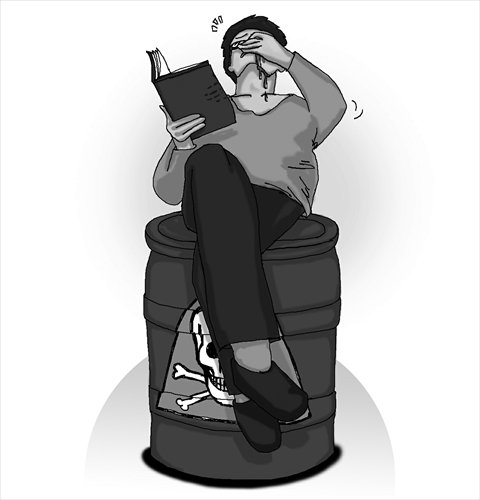
Illustration: Lu Ting/GT
News that 493 students fell ill due to extreme environmental contamination at a school in Changzhou, Jiangsu Province, has shocked the Chinese public.
China Central Television (CCTV) revealed on Sunday that Changzhou Foreign Language School (CFLS) was found to have been built directly next to a former toxic waste dump, resulting in abnormal blood parameters and/or diseases ranging from dermatitis, eczema, bronchitis to leukemia and lymphoma among its student body.
CFLS moved to their current new campus in September of 2015, near three former chemical factories where poisonous pesticides were produced. Students immediately started developing chronic coughs, headaches, rashes, vomiting and other uncomfortable feelings.
The CCTV news program quoted an anonymous employee who worked in one of the chemical factories for 30 years as saying that several prohibited toxic products had been manufactured there in the past and the waste water had been directly dumped outside the plant while poisonous materials were buried underground without proper treatment.
Environmental experts from Beijing interviewed by CCTV pointed out the demerits in the area's environment assessment report and assumed that the water and soil pollution nearby should be blamed for the outbreak among the students.
Changzhou government's official Sina weibo account announced Monday that an investigation is currently underway and will publicly reveal the results of its probe. It also added that among the 2,451 students of CFLS, five asked for leave and another five were transferring schools, while all the other students continue to lead "a normal school life." Its 210 teachers were also all in attendance, it said, except for three on sick leave.
The official announcement also claimed that related government departments had in recent months made efforts and taken measures to solve the pollution issue and therefore decided it was fine for students to continue studying on campus. The local government insists on the accuracy of their environment assessment report, and also claimes that the number of sick students was "far less" than the CCTV investigative report.
A Greenpeace press release issued on Monday said that "the tragedy that has occurred in Changzhou shows just how dangerously lax China's hazardous chemical management is."
Just one week ago, China's Ministry of Water Resources reported that more than 80 percent of groundwater in China is unfit for human consumption, based on monitoring by the ministry in 2015 in watersheds of major river systems including the Yangtze and the Yellow Rivers as well as 2,103 wells located in the Songliao Basin in Northeast China, the Huang-huai-hai Plain in East China and other basins and plains in Shanxi Province and Northwest China.
We have to admit that China's rapid economic development over the past decade was achieved at least partially at the cost of our environment and ecosystem. All industrialized nations have gone through similar "growing pains," though it certainly does not justify what continues to occur here in China.
I clearly remember when, in 2011, 21 children from a residential compound in Shanghai's Pudong New Area were found to have excessive lead in their blood. Upon media reporting the incident, departments from the local pollution prevention bureau and public health administration took quick, decisive action.
When my nephew from my hometown in Zhejiang Province told me that several of his classmates failed their physical examinations for army recruitment because of excessive levels of metal found in their blood test, I was shocked. But he was surprised by my "overreaction," saying that he didn't have any idea of the consequences of having excessive heavy metal in one's blood. His reaction well illustrates the situation among a majority of my countrymen.
I might be wrong to say that it's not a purely bad thing for the Changzhou case to come into limelight. With so many students and families involved as well as this brave report by CCTV and other media outlets in China and abroad, swift action will certainly be taken to quell the pollution, compensate the students as well as prevent future environmental catastrophes like this.
The opinions expressed in this article are the author's own and do not necessarily reflect the views of the Global Times.

